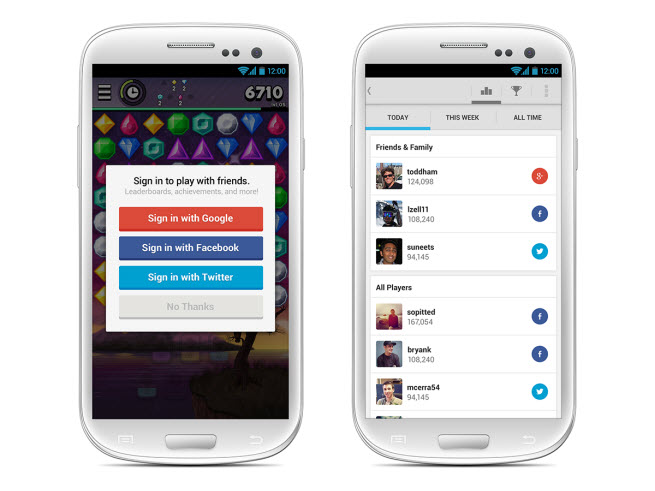Developers are speculating that Google is about to launch a Game Center for Android, or a meta app for games that will improve discoverability in the vast Google Play app store and make mobile games into a more social and lucrative experience.
[aditude-amp id="flyingcarpet" targeting='{"env":"staging","page_type":"article","post_id":734659,"post_type":"story","post_chan":"none","tags":null,"ai":false,"category":"none","all_categories":"business,games,mobile,social,","session":"D"}']So OpenKit is heading off that news with an announcement of its own: a universal social graph that makes games more social across both Apple and Google mobile platforms. The OpenKit technology will enable developers to create a common social network for their games regardless of what platform a user is on. OpenKit is on a fast-track effort because thousands of game developers were caught unprepared when Gree unexpectedly shut down OpenFeint, a mobile social platform, just before the holidays. They had no way to get their user data or code out of the platform and had to scramble to find an alternative.
Peter Relan, head of the YouWeb incubator that spawned OpenFeint, decided in December to create an open platform that developers could use to make their games more social. OpenKit was born (the company name and its open source project bear the same name) with the goal of providing common app services to game developers, who could simply integrate it and then focus on making their games.
AI Weekly
The must-read newsletter for AI and Big Data industry written by Khari Johnson, Kyle Wiggers, and Seth Colaner.
Included with VentureBeat Insider and VentureBeat VIP memberships.
“We’ll create a universal social graph for developers on mobile platforms,” Relan said in an interview with GamesBeat. “That’s important. I want to be able to play a game with my son, who is too young to be on Facebook. With OpenKit, I can send him an invite and play the same game. Players don’t have to worry, and developers don’t have to worry.”
With OpenKit, developers could integrate an applications programming interface (API) into their games that made it easy to set up social features such as leaderboards, user identity, and cloud storage. And they could do so with the confidence that the platform would be open. They wouldn’t be locked into it. They could take their data and code and move to another platform. And they would use it to help their games spread to other users via social means and then engage those users more readily. Players could issue challenges and get their friends hooked on the same game.
OpenKit will essentially duplicate some (but not all) of the services that OpenFeint delivered, such as the ability to identify users, authenticate their accounts and passwords, store their information on the Internet-connected data centers known as the cloud, and embed push communications in a game. Many of those features are headaches for developers, so OpenKit will provide cloud-based backend services that take the chores off the developers hands. The features are critical because they will enable “frictionless user acquisition,” or a cheap way to find new users.
That’s the long-term goal. For now, OpenKit is testing more limited features. In March, OpenKit launched its closed beta with features including cloud storage, achievements, universal authentication, Unity plug-ins, and leaderboards. Google could offer these features as well, but it would have no interest in making games on its platform interoperable with those on Apple platforms.
Relan said that OpenKit will allow players who are on iOS or Android to interact with each other across platforms. They won’t be tied to Apple, which has its wall garden in the form of Game Center, or Android, which is expected to have its own form of Game Center soon, based on rumors about next week’s Google I/O event.
Relan said the company plans to develop “smart invites” so that the platform will detect the invitee’s device and present the right app from the right app store in the invitation.
[aditude-amp id="medium1" targeting='{"env":"staging","page_type":"article","post_id":734659,"post_type":"story","post_chan":"none","tags":null,"ai":false,"category":"none","all_categories":"business,games,mobile,social,","session":"D"}']
“We are taking away the developer nervousness about the platform,” Relan said.
More than 1,500 developers are testing the service, and more features will be added before June.
“We are doubling down on this theme of removing friction: With iOS and Android equally prevalent among users, they need to be able to interact socially with each other regardless of what device they use,” Relan said. “Developers will also come out ahead because there will be frictionless sharing and inviting which will lead to more downloads for their games and apps.”
VentureBeat's mission is to be a digital town square for technical decision-makers to gain knowledge about transformative enterprise technology and transact. Learn More

